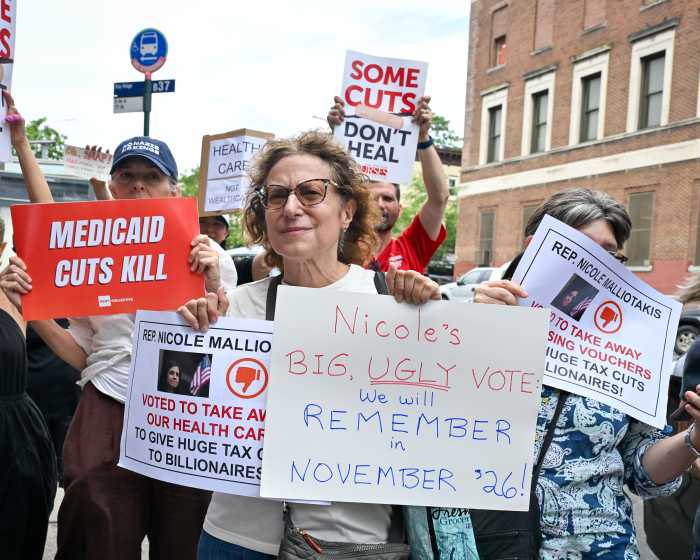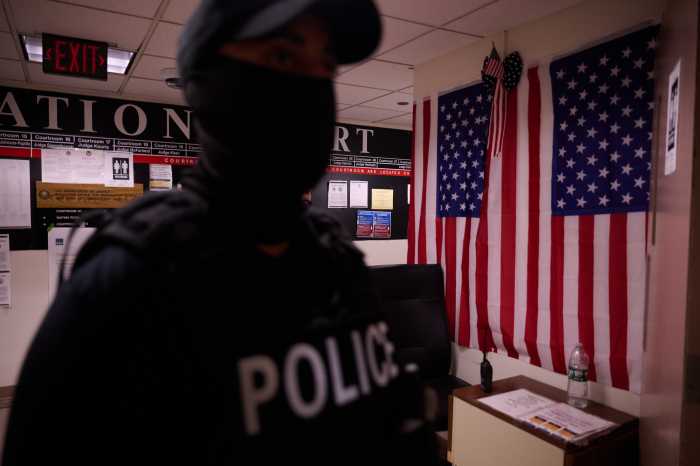Bay Ridge needs a bus running along Third Avenue.
To that end, Community Board 10 is recommending that the Metropolitan Transportation Authority (MTA), if they insist on axing the B-37 which currently runs along the thoroughfare, should replace it by rerouting the B-9 to run alone Third Avenue between 60th Street and Shore Road.
Indeed, the board voted unanimously at its February meeting, which was held at the Knights of Columbus, 86th Street and 13th Avenue, to suggest to the MTA that they make the route alteration, as well as several other moves aimed at preserving public transportation options for people living in Bay Ridge, Dyker Heights and Fort Hamilton.
“In the past,” noted Traffic & Transportation Committee Chair Doris Cruz, board members had shied away from making any recommendations that could be seen as service cuts. However, this time, she emphasized, “The chance of cuts is much more likely, and they will have a tremendous impact on Bay Ridge.”
The elimination of the Third Avenue bus was seen by board members as “the most serious proposed cut,” noted Cruz. While the MTA contends that the R train provides duplicative service, there are no handicapped-accessible stations in the neighborhood, meaning that people with disabilities, as well as the elderly, would have difficulty utilizing it.
Board member Ruth Berg pointed out that Bay Ridge has a high elderly population. “Can you imagine all these old people with canes going down to the R train?” she asked. “They are just looking at the numbers. They are not looking at people.”
“The elimination of the service would be a hardship to the residents of Community Board 10,” Cruz averred, even though the MTA has proposed rerouting the B-70 to bring it onto Third Avenue between Bay Ridge Avenue and Marine Avenue. That rerouting, to board members, seemed less inclusive and more serpentine
In addition, the B-70 is not the most reliable of buses, Cruz pointed out. “Reliance on a bus with a poor on-time record is a disservice to the community,” she contended.
Besides recommending the rerouting of the B-9 in the case of the B-37 being cut, the board also made several other recommendations.
For one thing, they voted to oppose a proposal made by the MTA to switch the routes of the B-1 and B-64 when they meet at 86th Street and 13th Avenue. While the authority wants that change to make the B-1 route more efficient (it would in effect become the 86th Street bus), board members were concerned that the switch would leave residents of Dyker Heights dependant on a less reliable bus.
“Are they saying, give 13th Avenue a crummy bus because it’s not as good as 86th Street?” demanded board member Fran Vella-Marrone, the president of the Dyker Heights Civic Association.
“The B-1 comes every seven minutes,” added board member Susan Pulaski. “The B-64 comes maybe every 15 to 20 minutes.”
Board members also voted to oppose two proposals that would negatively effect the express buses that serve the board area. One would eliminate midtown and uptown service on the B-27, B-37, B-28 and B-38, even though the B-27 is actually “the most cost-efficient” of all the city’s express bus routes, and the B-28 is not far behind.
“They are saying the increase per passenger will be 10 minutes,” Cruz told a skeptical group of her peers. “Riders estimate a 30 minute increase.” The change, she added, would result in “a more crowded commute, a longer commute and more standees on buses not designed for standees.”
The board also voted to oppose the MTA’s plan to eliminate weekend service on the B-27 and B-28, in large part because of the lack of handicapped access at any station in Bay Ridge, Dyker Heights and Sunset Park.
There is no question that express bus service in New York City is heavily subsidized. Nonetheless, “There are weekday routes that have lower ridership than these two buses (on weekends),” Cruz asserted, also noting that if riders had to take Access-a-Ride instead, that would cost the authority about $49 a ride, instead of the $12 or $13 that each ride on the B-27 and B-28 cost the MTA. (The average cost of an express bus ride is upwards of $16.)
Rather than seeing the weekend buses eliminated, board members voted to recommend that the MTA not cut the bus service, though they also voted to recommend that the authority look at increasing the intervals between buses, or “investigate” combining either Brooklyn and Staten Island routes or the B-27 and B-28 routes to save money.
Finally, the board voted to recommend that the authority not end W and M service as it plans, at least during rush hours, because of the negative impact such cuts would have on N and R train riders. A specific concern was the lengthened commutes that area residents would face, as well as “dangerous crowding” at 36th Street and Pacific Street, where many lines stop.
However, board members said, if the MTA goes ahead and ends M and W service, it should at least add extra R trains to handle the increased congestion that will undoubtedly afflict that line. “The R train runs so infrequently,” board member Larry Stelter stressed.
The MTA has proposed significant service cuts – including axing 23 other bus linesbesides the B-37, and two subway lines — later this year, as a way of closing a budget gap of approximately $400 million.
Many of the same cuts were proposed last year, when the authority also confronted a significant deficit, but were staved off when the authority was bailed out by the state legislature in a deal that included a 25 cent fare hike, but preserved the lines that had been proposed for elimination.
Opponents of the service cuts will have an opportunity to tell MTA brass their views early next month, at a public hearing to be held on March 3rd, beginning at 6 p.m., in the Brooklyn Museum’s Cantor Auditorium, 200 Eastern Parkway.






















